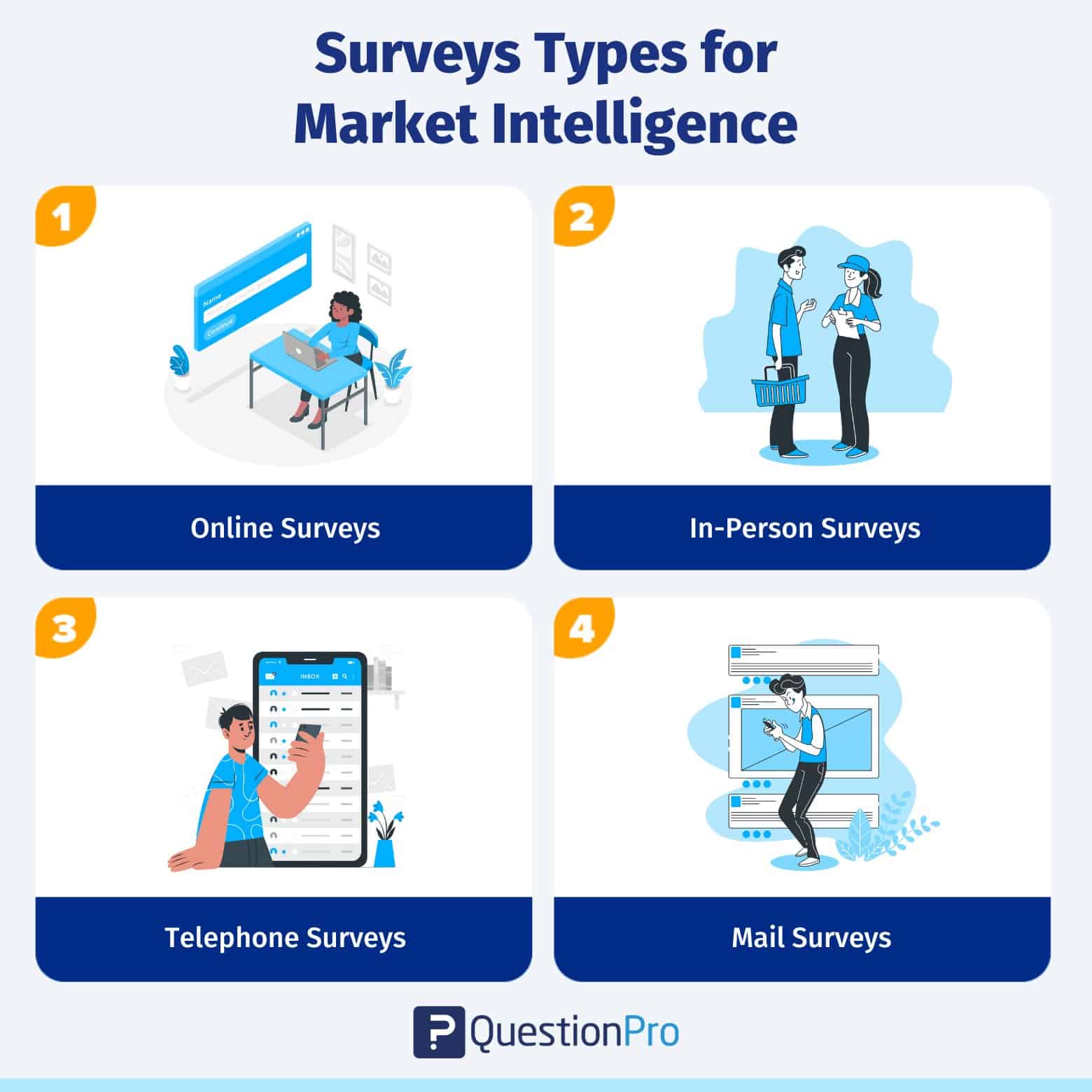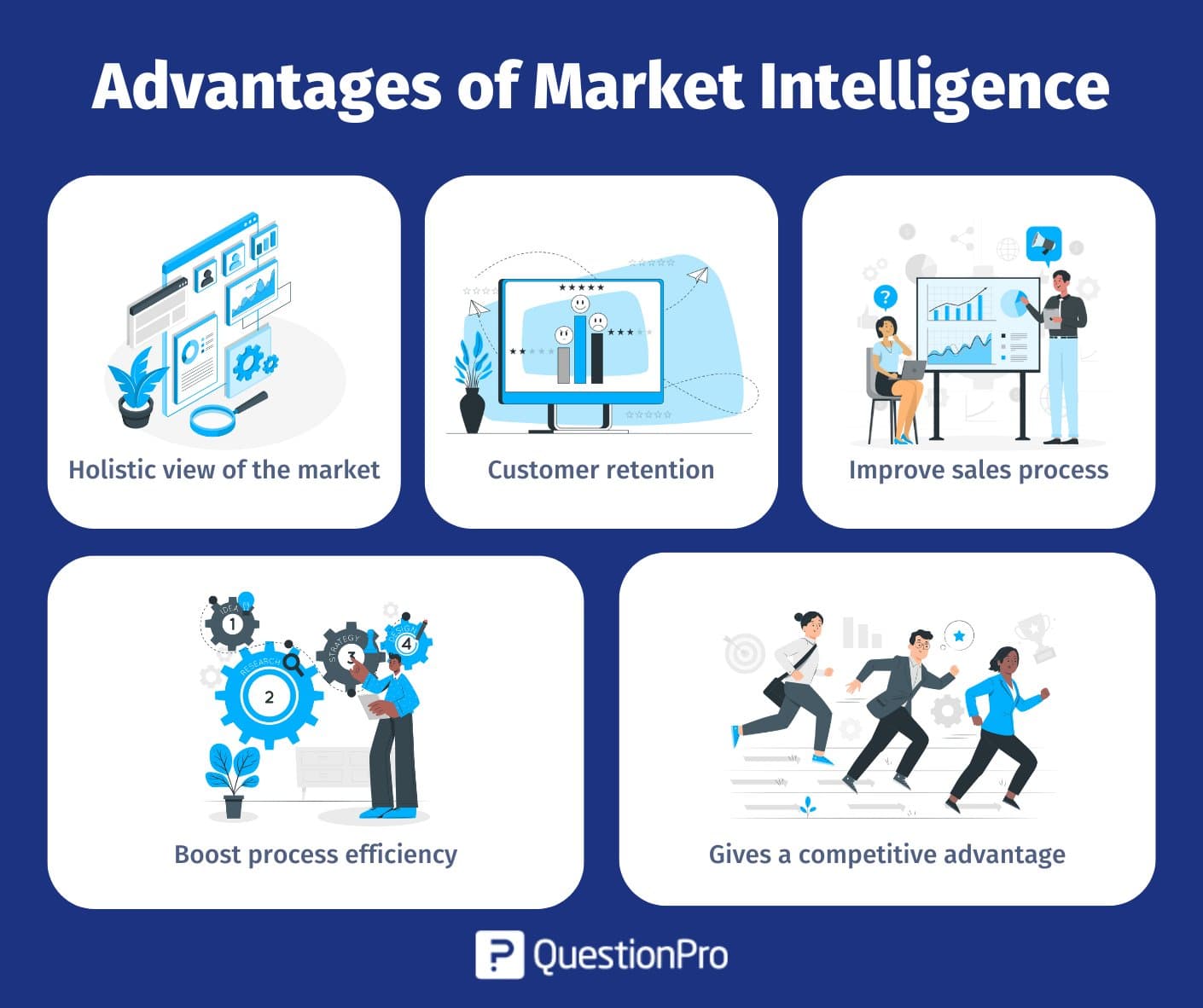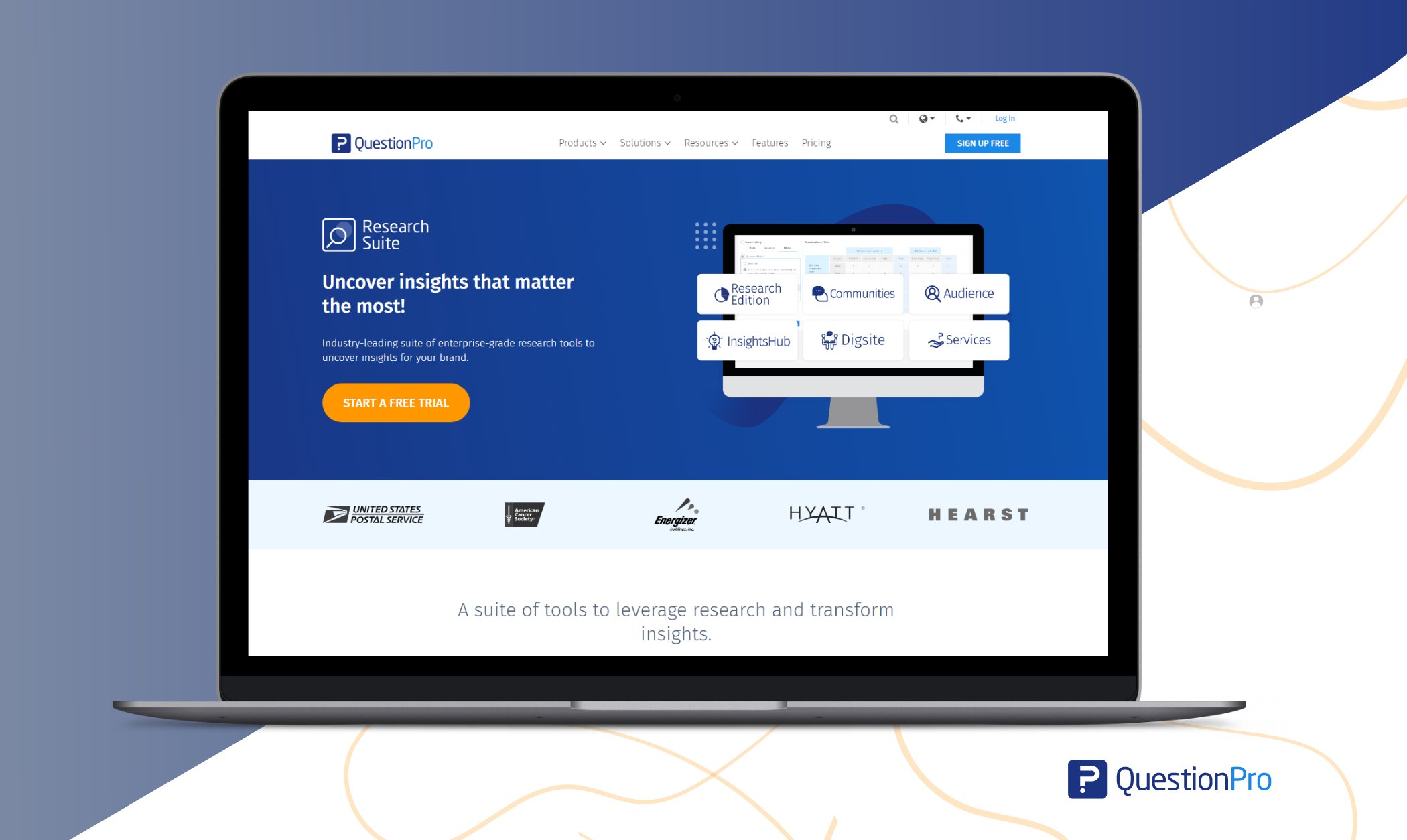
Market intelligence collects and analyzes external market data to guide strategic business decisions. It helps to provide insights into market trends, customer behavior, competitor activities, and potential opportunities or threats.
With this information, companies can better understand their market landscape, adapt to changing conditions, and make decisions on product development, pricing, marketing strategies, and expansion efforts.
Effective market intelligence helps businesses stay ahead and capitalize on new opportunities in an increasingly competitive market environment.
Market Intelligence: Definition
Market intelligence is defined as the information or data that is derived by an organization from the market it operates in or wants to operate in, to help determine market segmentation, market penetration, market opportunity, and existing market metrics. It is a vital aspect to understand the state of the market, as well as helps collect competitor intelligence which in turn aids towards becoming profitable.
For example, A company wants to understand who is the right target audience for a mobile phone they are launching soon. A profile survey can help the company to shortlist its target audience based on the type of mobile device they are launching.
However, incorporating market intelligence with business intelligence processes will enable a company to have a holistic view of the ongoing corporate performance in specific market conditions.
The Three Key Components of Market Intelligence
Market intelligence is closely associated with market research and can be explained in three simple parts as follows:
1. Competitor Intelligence
Competitor intelligence can be explained as the collection of data about your competitor using ethical methods such as government databases and public records.
For example, Japanese automotive companies were able to capture the US markets and even dominate them using competitor intelligence. Understanding the need for high quality, fuel-efficient cars led them to strategize and penetrate the US market successfully.
2. Product Intelligence
Product intelligence is gathering data related to competitor products or similar products in the market. For example, A telecommunications company needs to monitor the prices of competitive mobile phones in the same segment.
A price drop in the competitor product can mean the company is introducing a new model in the market. Understanding such information can enable a company to strategically launch their models at the right time and price.
3. Market understanding
Market understanding is knowing the market share of your company, trends in the market, the size of the market and which is your target market. Understanding the demand in the market, and customer wants can help a company tremendously to increase their revenues and market share.
For example, A comprehensive market research can give valuable insights to a brand, for instance, the target market is age 20-40, upper-middle-class family and the trend in the market is for Crossfit training to get fit and healthy. A particular gym can use this information and provide services specific to this requirement enabling them to penetrate the market much faster than the usual gyms.
Types and Methodologies with Examples
While marketing research is a vast topic and can be gathered through various quantitative or qualitative methods, most companies prefer the following basic methodologies to collect market intelligence.
01. Data collection
Some basic data collection methodologies for Market intelligence are as follows:
# Surveys Types

Survey research involves a set of questions put together in a concise manner to gather data from the target market and analyze the same to create valuable market intelligence. The larger the group of people, the more reliable are the results. There are various methods in which surveys can be conducted depending on what information needs to be collected.
01. Online Surveys
These are the best and one of the most economical methods to get data in a swift manner. Such surveys have been associated with unreliable data, but with newer tools coming into the market, this method has become very popular and reliable, to get real-time data fast. Furthermore, the majority of the target audience already prefers online communication, hence online surveys are the best method to gather market intelligence.
For example, A mobile company wants to understand the competitor’s position in the market to launch its own product in the same segment. A competitor in-depth analysis survey can be conducted to understand the competitor’s position in the market, their product features, and their market share. Such information will enable the company to decide the right audience, the features, and the correct pricing to capture higher market share.
02. In-Person Surveys
These surveys are one to one interviews which can be conducted in high traffic locations such as malls to gather required information. This also allows you to gather customer feedback as you have the advantage of showcasing a product or comparing products and gather valuable information.
Such a method has high response rates, however, it is quite expensive as a skilled person is needed at every location with an appropriate device such as a tablet which tends to be costly.
For example, A FMCG company wants to launch a new product in the market for women. In-person surveys can be conducted in malls to understand the trend for particular cosmetic products and preference of its target audience. Accordingly, the product can be modified and launched in the market to have a direct impact on the demand of the audience.
03. Telephone Surveys
These surveys are comparatively less expensive as compared to in-person surveys but are costlier than mail surveys. Although, a number of companies use telemarketing and hence the consumer does not respond well due to constant badgering. Therefore, it gets very difficult to convince the consumer to take the survey, thus reducing response rates, as well as the quality of responses.
For example, businesses need to understand public opinion about specific products, for instance – laptops. A telephone survey can be conducted with a set of questions that include product features, brand preference, price comfort, and many more, which can help the company to launch the right kind of product in the market.
04. Mail Surveys
These are one of the cheapest ways to conduct surveys, especially to a larger audience. Since the advancement in technology, people have stopped reading paper mails nowadays and hence the response rates for such a method is only 3-15%. However, in areas where technology is still inaccessible, such method is still dominant to gather required information from the audience.
Methodologies of Data Collection for Market Intelligence
1. Questionnaires
A questionnaire is a series of questions asked in a printed or online format to conduct research. They can be used for qualitative as well as quantitative research and can be used to gather data from a large set of audience.
2. Polls
Polls are somewhat like surveys, however, in such a method there is only one question to answer. Since it takes very less time to answer these, the response rate is extremely high.
3. Forms
Forms are a set of questions asked by a researcher to collect very specific information required for the task at hand. Such a method does not include questions that will state opinions or feedbacks from the respondent.
4. Focus groups
Focus groups are a set of people selected carefully to represent a target market. Using focus group surveys, a company can evaluate customer demands and opinions or even take feedback from the group. This enables to collect information that can be helpful to a company to penetrate that market or to launch a new product in an existing market.
Usually, a moderator is required to ask the question to a set of people where a discussion unveils insights into that topic. However, focus group surveys can now be done online as well thus eliminating the need for a moderator.
For example, A focus group is asked about their opinions to understand what would be the most ideal phone for them. A discussion amongst them will give the company information as to what dimension is most preferred in the market and what are the reasons.
Reasons such as particular features of the product, screen size, the color of the phone, the speed of the operating system, pricing, etc. can give the company insights in which particular area they need to invest more and accordingly use this intelligence to capture higher market share.
5. Personal Interviews
Interviews are generally an expensive affair but provide valuable, reliable information. Such a method is used to understand in-depth about a particular topic or a product. They are unstructured open-ended questionnaires and can last to an hour.
However, since they are done on an individual basis, such a method is not preferred to gather market information, as it will not represent the market as a whole. Although, interviews with subject matter experts can give you an understanding of the market trends in a particular industry if you are not well acquainted with such industry information.
For example, A company wants to understand what are the current technological trends in the market. An interview with a subject matter expert in technological solutions can give a company valuable information as to what is trending and what can be expected in the near future. Accordingly, strategic business informed decisions can be taken to invest in the right direction.
6. Observation
Sometimes the data gathered through other types will not give you reliable data or won’t give you insights about the customer attitudes or buying behavior. In such a case the observation method provides you with information such as habits of the customer, buying patterns, customer preferences such as quality or price, etc. Understanding this information will enable a company to sell better and make changes in their products according to the demand.
For example, Brands have cameras fitted in their stores, which are continuously recording and viewed later to understand the behavior of their consumers. Using this observation, a company can hack into unconscious buying behaviors or attitudes of the target market.
7. Field trials
Field trials are like conducting experiments in real time. It involves placing a product in specific stores to understand customer response to the new product. It can be called a pilot run to test the product in the market.
For example, A chocolate company wants to test a new product they want to launch. Hence a few select stores are provided with these chocolates to be tested with their target customers. These customers have to represent the target market and hence their feedback will enable the company to understand if the product will work in the market or not.
02. Analysis
Information is different from intelligence. Information is not useful until it has some meaning to it. The information is nothing but knowledge about a particular topic or product, while intelligence is about meaningful information which can be used to take action. In order to transform collected data to meaningful intelligence, unit of analysis has to be performed on the collected data.
There are various market intelligence software in the market. Such software not only allows you to collect data but also analyze the data using advanced analytical methods. Analyzing the information collected helps you transform it to valuable market intelligence thus enabling a company to understand target market opinions, trends, competition and where improvements or modifications are needed.
Advanced analytical techniques such as Conjoint analysis, Maxdiff analysis, Gap analysis, Trend analysis, Text and Sentiment analysis allow a company to understand the market accurately which aid them to make strategic business decisions.
For example, it is important for a company to monitor the market on an ongoing basis. By analyzing and monitoring the trends, measuring customer satisfaction scores and Net promoter scores, a company can stay competitive and manage to increase the market shares, its revenues and also retain its customers. If needed, accordingly decisions can be taken to change or modify the product on the basis of the current trends or the situation.
03. Reports and Presentation
Reports and presentation are an important step in using market intelligence. Infographics of reports and visual will enable a company to understand the markets in an easier manner and can answer questions like what do the metrics mean? Wrong interpretation of such data can be hazardous for the company, hence this step plays a vital role in the market intelligence process.
The entire market intelligence process has now become much easier using reliable and powerful market intelligence software. Thus using market intelligence effectively can enable a company to penetrate a market successfully and effectively, determine market segmentation, understand the competition and understand the market as a whole.
Advantages of Market Intelligence
Market intelligence not only helps companies to distinguish their brand from its competitors but also helps in providing valuable information to stay in the game and excel at it. Following are some of the benefits that market intelligence provides.

1. Holistic view of the market
Holistic view of the market – Understanding the market completely can lead a company to success in no time. Market intelligence is gathering data in real time from the market and further understanding the customers, trends, behaviors, etc, thus enabling a company to stay competitive and meet market demands.
2. Customer retention
No matter how old a customer is to a company, they are always being monitored and attacked by the competition. Understanding when the customer is dissatisfied and the reasons behind it can prevent loss of customers.
Market intelligence can help you analyze and give you insights into the areas of improvements that are needed by the customers and thus help you retain them and understand customer lifetime value.
3. Improve sales process
Businesses having a variety of products and a large number of customers often face an issue, i.e. which product to target to which groups? Market intelligence helps you to determine market segmentation, thus allowing the company to understand which product will succeed with which group of people.
4. Boost process efficiency
Market intelligence helps businesses to boost overall efficiency and productivity by identifying gaps, giving actionable insights to devise crucial business strategies and provides an organization with real time data and analytics.
5. Gives a competitive advantage
First mover advantage or the launch of a product at the perfect time is a well heard off statement in a lot of business conversation. These are possible only by using market intelligence.
Market intelligence helps you keep a watch on the competition, the upcoming trends, and gives a complete picture of the market, which allows a company to penetrate the market or capture the market share by launching a product or a new feature at the right time thus giving them a competitive advantage.
Importance of Market Intelligence for An Organization
Market intelligence is vital to the success of any organization, being the foundation on which all marketing is based. Effective use of market intelligence involves the collection of data, analysis and end use of the information.
Market intelligence helps you to become customer-centric, understand the market demands and consumer opinions, collect real-time relevant data, boost your upselling opportunities, reduce risks, capture higher market shares and gives you a competitive advantage.
Following are a few points, to understand why market intelligence is crucial to any business.
1. To understand your position in the market
Collecting market intelligence through surveys allows you to understand the market in-depth. It will give you insights into what the competitors are doing, what is the market demand and who will be your target audience and many more. Analyzing this information will enable a company to evaluate its position in the market and make strategies accordingly.
2. To evaluate your product
Conducting marketing intelligence surveys will give you actionable insights on the product trends in the market, the demand for specific features and product specification currently in demand. Such information helps you to evaluate your product and make wise business decisions accordingly.
3. To know your target audience
Gathering market intelligence will allow a company to understand the needs of the audience and using surveys, businesses can shortlist their target audience for specific products/services.
4. To conduct competitor analysis
Market intelligence is a vast field. Conducting surveys to gather intelligence about your competitors is vital in today’s business environment. Using such information, businesses can modify their products as per the need, understand competitors failures or successes, and devise strategies based on the competitor’s position.
These benefits are crucial to the success of any business and hence market intelligence is one of the most crucial elements in executing effective plans for the prosperity of any business.
Use QuestionPro Research Suite for Market Intelligence

The QuestionPro Research Suite is an excellent tool for gathering market intelligence quickly and efficiently. It offers an easy-to-use platform for conducting surveys, polls, and focus groups to collect valuable insights from your target audience.
Whether launching a new product, exploring customer preferences, or studying market trends, QuestionPro makes it simple to design surveys and analyze data in real time.
With the advanced analytics and reporting features, you can turn raw data into actionable strategies. This great solution helps businesses make smarter decisions, stay ahead of the competition, and have better knowledge of their customers.
Conclusion
Market intelligence is essential for businesses aiming to make informed, data-driven decisions that enhance their market position, and most importantly, unearth growth opportunities.
By utilizing a range of data collection methods such as surveys, polls, focus groups, and field trials, companies can gain valuable insights into market trends and consumer behavior.
For market intelligence, tools like the QuestionPro Research Suite are essential. They provide comprehensive solutions for conducting surveys, managing focus groups, and analyzing market intelligence data. With its features, QuestionPro helps businesses gather, analyze, and leverage market intelligence to remain competitive and succeed.
Frequently Asked Questions( FAQs)
Market intelligence is the process of collecting and analyzing external data about a market to help businesses make informed decisions, understand trends, and stay competitive.
The goal of market intelligence is to gather and analyze data about market trends, customer preferences, and competitor activities to inform strategic business decisions, identify growth opportunities, and enhance overall competitiveness.
Key elements of market intelligence include:
1. Data Collection.
2. Market Analysis.
3. Competitor Insights.
4. Customer Understanding.
5. Market Trends.
6. Strategic Decision-Making.







